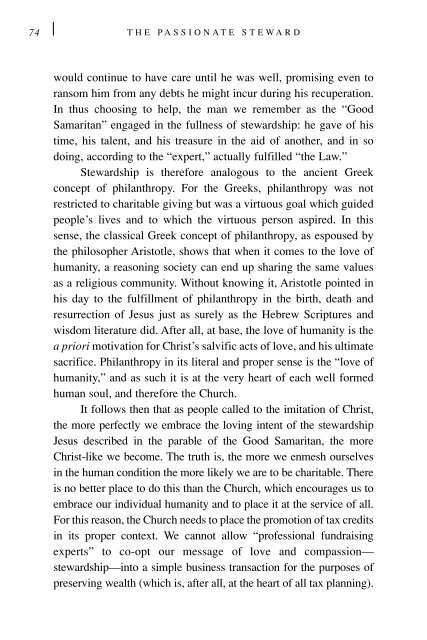Passionate Steward - 10th Anniversary Edition
10th Anniversary Edition of The Passionate Steward - Recovering Christian Stewardship from Secular Fundraising (St. Brigid Press - 2002).
10th Anniversary Edition of The Passionate Steward - Recovering Christian Stewardship from Secular Fundraising (St. Brigid Press - 2002).
You also want an ePaper? Increase the reach of your titles
YUMPU automatically turns print PDFs into web optimized ePapers that Google loves.
74 THE PASSIONATE STEWARD<br />
would continue to have care until he was well, promising even to<br />
ransom him from any debts he might incur during his recuperation.<br />
In thus choosing to help, the man we remember as the “Good<br />
Samaritan” engaged in the fullness of stewardship: he gave of his<br />
time, his talent, and his treasure in the aid of another, and in so<br />
doing, according to the “expert,” actually fulfilled “the Law.”<br />
<strong>Steward</strong>ship is therefore analogous to the ancient Greek<br />
concept of philanthropy. For the Greeks, philanthropy was not<br />
restricted to charitable giving but was a virtuous goal which guided<br />
people’s lives and to which the virtuous person aspired. In this<br />
sense, the classical Greek concept of philanthropy, as espoused by<br />
the philosopher Aristotle, shows that when it comes to the love of<br />
humanity, a reasoning society can end up sharing the same values<br />
as a religious community. Without knowing it, Aristotle pointed in<br />
his day to the fulfillment of philanthropy in the birth, death and<br />
resurrection of Jesus just as surely as the Hebrew Scriptures and<br />
wisdom literature did. After all, at base, the love of humanity is the<br />
a priori motivation for Christ’s salvific acts of love, and his ultimate<br />
sacrifice. Philanthropy in its literal and proper sense is the “love of<br />
humanity,” and as such it is at the very heart of each well formed<br />
human soul, and therefore the Church.<br />
It follows then that as people called to the imitation of Christ,<br />
the more perfectly we embrace the loving intent of the stewardship<br />
Jesus described in the parable of the Good Samaritan, the more<br />
Christ-like we become. The truth is, the more we enmesh ourselves<br />
in the human condition the more likely we are to be charitable. There<br />
is no better place to do this than the Church, which encourages us to<br />
embrace our individual humanity and to place it at the service of all.<br />
For this reason, the Church needs to place the promotion of tax credits<br />
in its proper context. We cannot allow “professional fundraising<br />
experts” to co-opt our message of love and compassion—<br />
stewardship—into a simple business transaction for the purposes of<br />
preserving wealth (which is, after all, at the heart of all tax planning).




